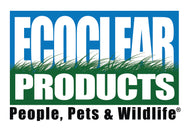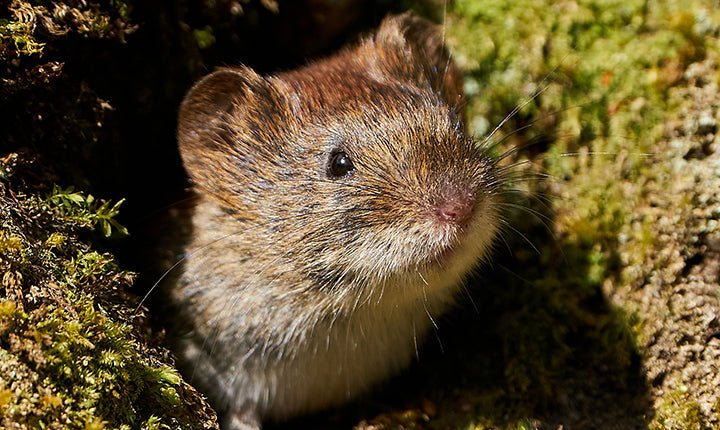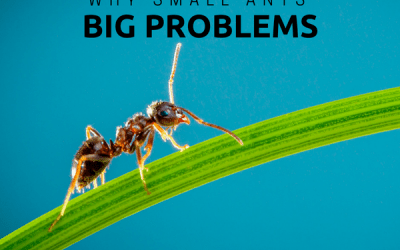
Among the many rodent pests that can plague your property, none are more devastating to your yard or garden than voles.
Unlike rats or mice, these small rodents actually prefer to live outdoors and feed on the roots and stalks of plants. They are also quite hardy and prolific breeders, making them historically hard to treat. What’s worse, many common rodenticides used to control vole populations can pose severe health risks for outdoor pets, wildlife, and even garden plants. If you are dealing with a growing vole population on your property, you need a control solution that works to eliminate these rodents without causing extra damage to your garden. Enter VoleX™: a scientifically-formulated pellet from our engineers here at EcoClear Products designed to safely eliminate voles without posing any risks to pets, wildlife, or garden flora. On this page, we discuss vole control using VoleX™ and provide tips and tricks that you can use to keep your garden vole free. Read on to learn more, and shop VoleX™ with us today!

What Is a Vole? Why Are Voles Dangerous for Your Garden?
In outdoor gardens and farms, there are few rodent pests more insidious or infamous than the vole. Voles are small rodents Cricetidae and subfamily Arvicolinae. They are sometimes referred to as meadow mice or field mice, though they have stouter bodies and rounder heads than mice. Perhaps the biggest difference between voles and other rodents is that voles prefer to feed on plant roots, stalks, and other foliage. This makes them particularly dangerous for gardens and farms.
There are 155 vole species known to exist across the world. In North America, the two most common by far are the prairie vole and the meadow vole. Meadow voles are more widely distributed, but prairie voles are more common in prairie areas such as the central U.S. and Canada. Voles are most active in the springtime, and vole populations tend cycle, with booms every 3 to 5 years. Common signs of vole infestations include snake-like tunnels is soil, as well as partially-eaten vegetables, bulbs, and plant roots. Voles also commonly nest at the bases of trees and shrubs. A close inspection of your yard can help you find these nests relatively quickly.
Preventing Voles on Your Outdoor Property
Whether you are a homeowner with a small garden or farmer trying to protect your crops, the last thing you need on your property is a vole infestation. Follow these prevention steps to keep your property vole-free from the very start.
- Cut back vegetation wherever possible. Voles like dense, heavy vegetative cover. It gives them places to hide and nest. Cut back excess leaves, weeds, and grass to reduce vole habitat and dissuade voles from nesting in your garden.
- Fence off your garden plants. Fencing off each of your garden plants with wires can block voles’ access to food. Extending your wire fence an inch or two under the soil will help ensure that voles don’t tunnel their way to your plants.
- Surround bulbs with gravel. Discourage voles from nibbling on bulbs by adding gravel to the planting hole and surrounding the bulbs when planting.
- Encourage vole predators. Voles have many natural predators, including snakes, hawks, owls, foxes, and badgers. Dogs and cats can also be conditioned to hunt voles. Make your property hospitable to these vole predators by choosing responsible extermination products and other garden care solutions.
Treating Voles: The Issue With Common Rodenticides
Even with the best prevention tips in place, vole infestations can still occur. In these cases, it’s important to choose a vole control solution that not only exterminates voles, but keeps you property and those on it safe. The unfortunate truth is that many vole extermination solutions on the market today can be incredibly risky to use in outdoor spaces because they pose significant health risks to people, pets, and wildlife. Products containing anticoagulants, sodium borate, strychnine, bromethalin, zinc phosphide, and cholecalciferol can be lethal if consumed in alrge quantities by animals or humans. Studies conducted by the EPA also show that some rodenticides can cause damage to crops and other plant life. If you’re trying to exterminate voles on your property, you need a solution that will do the job without posing risks to pets, plants, or the environment at large. VoleX™ is that solution.
Eco-Friendly and Highly-Effective Vole Control With VoleX™
New from our engineers here at EcoClear Products, VoleX™ is an eco-friendly and highly-effective rodenticide designed to exterminate voles. Made from all-natural ingredients, VoleX™’s unique formulation both attracts voles via scent and taste and exterminates them as humanely as possible. Upon ingestion, active ingredients in VoleX™ coat the vole’s stomach lining, blocking all messages sent between the stomach and the brain. This causes the vole to stop eating and drinking, leading to dehydration, circulatory failure, and eventual death. For the vole, the process feels like nothing more than the onset of fatigue.
Aside from its effectiveness, one of the biggest benefits of VoleX™ is its safety and overall eco-friendliness. VoleX™ pellets are made from all-natural ingredients and are 100% biodegradable — great for outdoor use in residential gardens and farms alike. VoleX™ is also safety to use around people, pets, wildlife, and livestock with virtually no health risks associated with primary or secondary consumption.
Learn More and Shop VoleX™
Want to learn more about how to keep voles off your outdoor property? Contact our team here at EcoClear Products to speak with one of our pest control representatives directly. Interested in giving VoleX™ a try? Use our Store Locator to find an EcoClear Products retailer near you!
Sources
Analysis of rodenticide bait use. U.S Environmental Protection Agency, Office of Prevention, Pesticides, and Toxic Substances, U.S. Govenrment Printing Office: Washington, DC, 2004.



